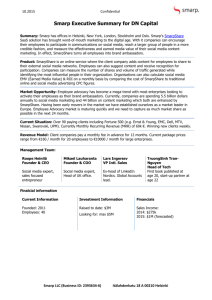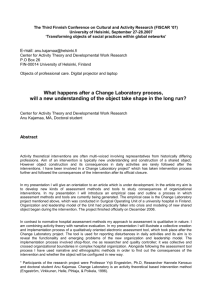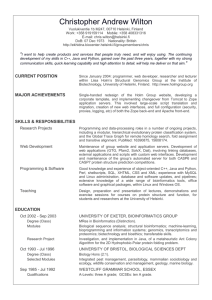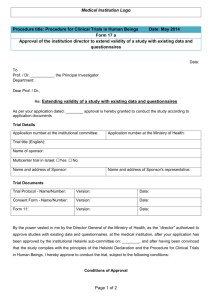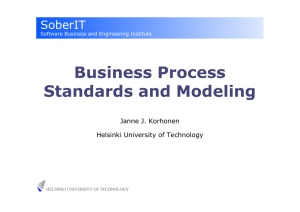Requirements Change Management Process
advertisement
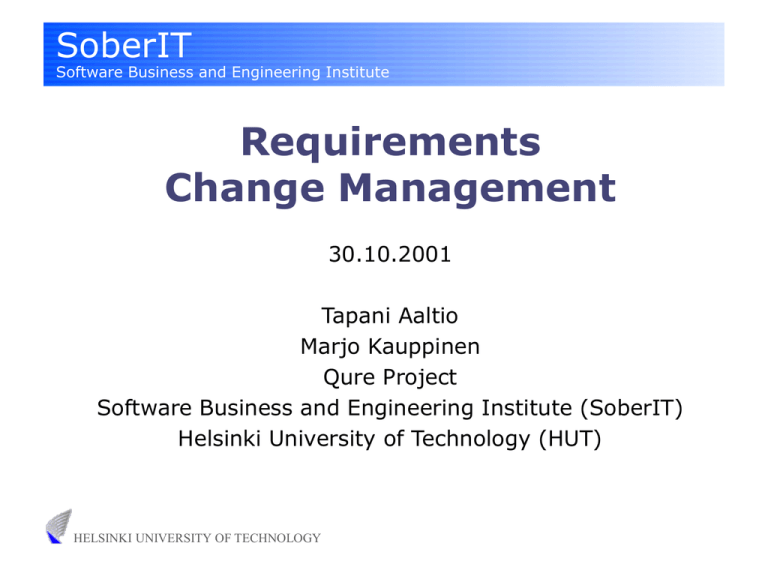
SoberIT Software Business and Engineering Institute Requirements Change Management 30.10.2001 Tapani Aaltio Marjo Kauppinen Qure Project Software Business and Engineering Institute (SoberIT) Helsinki University of Technology (HUT) HELSINKI UNIVERSITY OF TECHNOLOGY SoberIT Software Business and Engineering Institute Agenda • Introduction • Requirements Change Management Process • Traceability • Summary HELSINKI UNIVERSITY OF TECHNOLOGY SoberIT Software Business and Engineering Institute Introduction (1/3) requirements definition specification & design & coding & testing acceptance testing requirements management Requirements management is the process of managing changes to a system’s requirements [Kot98], and it is an important part of requirements engineering. HELSINKI UNIVERSITY OF TECHNOLOGY SoberIT Software Business and Engineering Institute Introduction (2/3) • It is often the case that more than 50% of a system’s requirements will be modified before it is put into service [Kot98]. • New requirements emerge and existing change due to • errors • increased understanding • change in external circumstances. HELSINKI UNIVERSITY OF TECHNOLOGY SoberIT Software Business and Engineering Institute Introduction (3/3) Changes to the requirements should be documented and controlled formally. Change management process ensures that • changes are made systematically • similar information is collected for each proposed change • overall analysis is made about the costs, benefits and timing • the requirements document is updated. HELSINKI UNIVERSITY OF TECHNOLOGY SoberIT Software Business and Engineering Institute Requirements Change Management Process (1/5) • approved user requirements document • change proposal • updated user requirements document • change history requirements change management process recording analysing HELSINKI UNIVERSITY OF TECHNOLOGY deciding implementing SoberIT Software Business and Engineering Institute Requirements Change Management Process (2/5) Recording a change proposal: • Stakeholders submit proposals for requirements changes using a pre-defined form. HELSINKI UNIVERSITY OF TECHNOLOGY SoberIT Software Business and Engineering Institute Requirements Change Management Process (3/5) Analysing a change request: • The proposed change is analysed to see • if it is valid. Sometimes stakeholders misunderstand the requirements and suggest unnecessary changes. • how many requirements and system components are affected • how much it would cost, in both time and money, to make the change • what the benefits of the change are. HELSINKI UNIVERSITY OF TECHNOLOGY SoberIT Software Business and Engineering Institute Requirements Change Management Process (4/5) Deciding on a change request: • Change requests are considered formally by a group or a person who decide whether or not the change should be accepted. HELSINKI UNIVERSITY OF TECHNOLOGY SoberIT Software Business and Engineering Institute Requirements Change Management Process (5/5) Implementing a change: • • Updating the requirements document. Informing all the necessary people. HELSINKI UNIVERSITY OF TECHNOLOGY SoberIT Software Business and Engineering Institute Traceability • Requirements cannot be managed effectively without requirements traceability • Traceability types [Kot98]. [Som97] • requirements - sources • requirements - rationale • requirements - requirements • requirements - architecture • requirements - test cases HELSINKI UNIVERSITY OF TECHNOLOGY SoberIT Software Business and Engineering Institute Summary (1/2) Requirements Engineering User requirements definition Design, coding and system testing Acceptance testing User requirements management Useful and Successful Products HELSINKI UNIVERSITY OF TECHNOLOGY SoberIT Software Business and Engineering Institute Summary (2/2) Systematic requirements change management ensures that product development produces useful and succesful systems. HELSINKI UNIVERSITY OF TECHNOLOGY SoberIT Software Business and Engineering Institute References • [Kot98] G. Kotonya and I. Sommerville, Requirements Engineering Processes and Techniques, John Wiley & Sons, New York, 1998. • [Som97] I. Sommerville and P. Sawyer, Requirements Engineering A Good Practice Guide, John Wiley & Sons, New York, 1997. HELSINKI UNIVERSITY OF TECHNOLOGY
